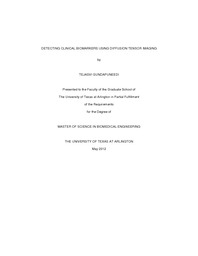
ATTENTION: The works hosted here are being migrated to a new repository that will consolidate resources, improve discoverability, and better show UTA's research impact on the global community. We will update authors as the migration progresses. Please see MavMatrix for more information.
Show simple item record
| dc.contributor.author | Gundapuneedi, Tejasvi | en_US |
| dc.date.accessioned | 2012-07-25T19:09:22Z | |
| dc.date.available | 2012-07-25T19:09:22Z | |
| dc.date.issued | 2012-07-25 | |
| dc.date.submitted | January 2012 | en_US |
| dc.identifier.other | DISS-11592 | en_US |
| dc.identifier.uri | http://hdl.handle.net/10106/11085 | |
| dc.description.abstract | Diffusion tensor imaging (DTI), a modality of MRI that measures water diffusion properties noninvasively, is highly sensitive to subtle structural changes of white matter. It provides a unique and noninvasive method for delineating in-vivo architecture of human brain white matter. Four metrics derived from DTI, fractional anisotropy (FA), mean diffusivity (MD), axial diffusivity (AxD) and radial diffusivity (RD), have been widely used to quantitatively characterize the white matter disruption in mental disorders and degenerative diseases. An atlas-based approach incorporating a digital white matter atlas and registration and skeletonization functions of tract-based spatial statistics (TBSS) has been developed recently. This approach effectively delineates the white matter disruption at both voxel level and tract level. More importantly, the information on disruption of the functional tracts has clinical significance. In our studies, we have applied this approach to two important clinical groups, maltreated children and elderly subjects with mild cognitive impairment (MCI). Maltreated children are more vulnerable than normal group to develop mental disorders. The early traits of white matter structural abnormality in this could be found in our study. MCI involves the onset and evolution of cognitive impairment. The elderly subjects with MCI have higher risk of later developing dementia, including Alzheimer's disease (AD). In our study, the integrity changes of limbic system tracts, which are severely damaged in AD, for MCI subjects, were revealed. These limbic tract changes could serve as the potential early white matter biomarker for AD. | en_US |
| dc.description.sponsorship | Huang, Hao | en_US |
| dc.language.iso | en | en_US |
| dc.publisher | Biomedical Engineering | en_US |
| dc.title | Detecting Clinical Biomarkers Using Diffusion Tensor Imaging | en_US |
| dc.type | M.S. | en_US |
| dc.contributor.committeeChair | Huang, Hao | en_US |
| dc.degree.department | Biomedical Engineering | en_US |
| dc.degree.discipline | Biomedical Engineering | en_US |
| dc.degree.grantor | University of Texas at Arlington | en_US |
| dc.degree.level | masters | en_US |
| dc.degree.name | M.S. | en_US |
Files in this item
- Name:
- Gundapuneedi_uta_2502M_11592.pdf
- Size:
- 3.660Mb
- Format:
- PDF
This item appears in the following Collection(s)
Show simple item record


